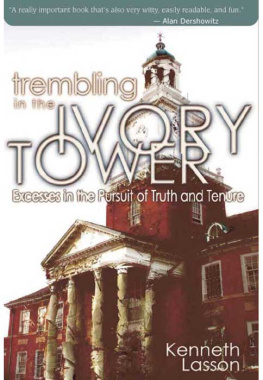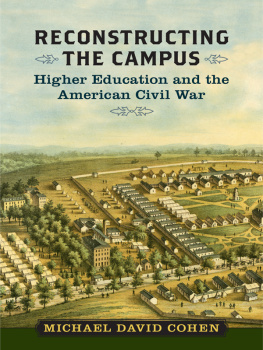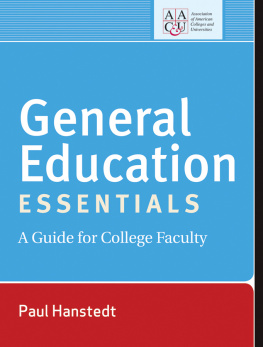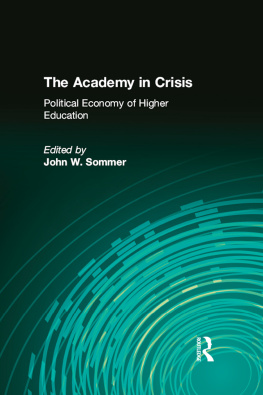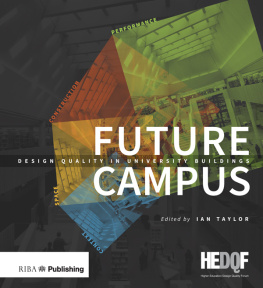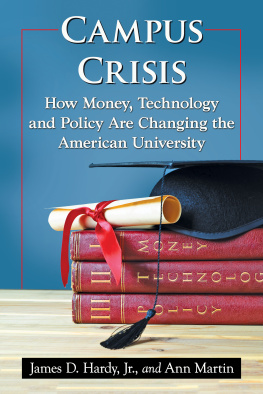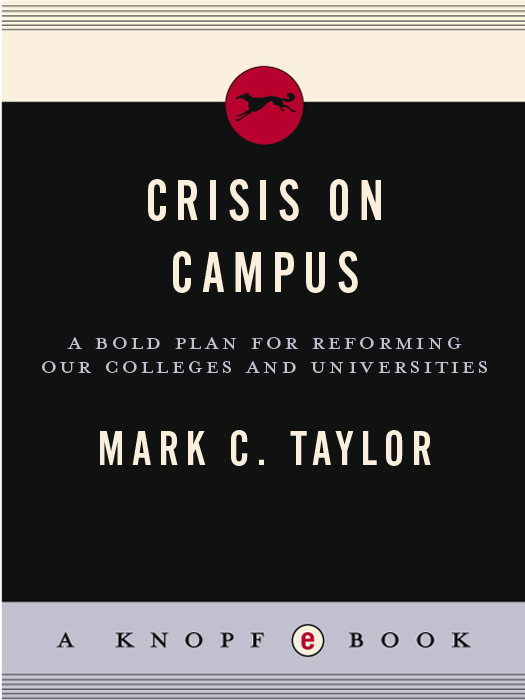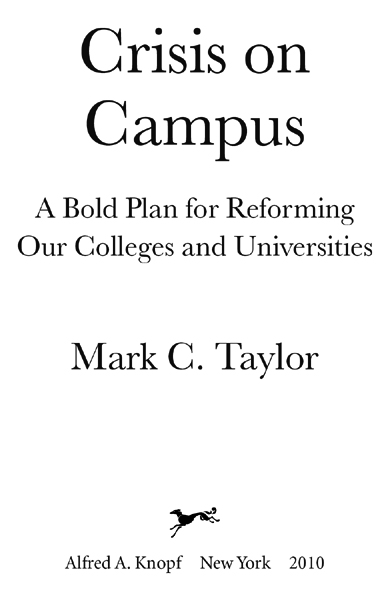ALSO BY MARK C. TAYLOR
Refiguring the Spiritual
Field Notes from Elsewhere: Reflections on Dying and Living
After God
Mystic Bones
Confidence Games: Money and Markets in
a World Without Redemption
Grave Matters
The Moment of Complexity: Emerging Network Culture
About Religion: Economies of Faith in Virtual Culture
The Picture in Question: Mark Tansey and the
Ends of Representation
Critical Terms for Religious Studies
Hiding
Imagologies: Media Philosophy
Nots
Disfiguring: Art, Architecture, Religion
Double Negative
Tears
Altarity
Deconstruction in Context: Literature and Philosophy
Erring: A Postmodern A/theology
Deconstructing Theology
Journeys to Selfhood: Hegel and Kierkegaard
Unfinished: Essays in Honor of Ray L. Hart
Religion and the Human Image
Kierkegaards Pseudonymous Authorship:
A Study of Time and the Self
For
Selma Linnea
and
Elsa Ingrid
All things are entwined, enmeshed, enamored.
Friedrich Nietzsche
Contents
9.
1
Reprogramming the Future
American higher education has long been the envy of the world. Much of the most important research that has contributed to the advancement of knowledge and enrichment of human life historically has been conducted in our colleges and universities. In the years following World War II, increasing prosperity and enlightened government policies led to rapidly expanding undergraduate programs that created new opportunities for countless young people. But in the past four decades, this situation has gradually deteriorated. The quality of higher education is declining; colleges and universities are not adequately preparing students for life in a rapidly changing and increasingly competitive world. As emerging technologies continue to transform how we manage information and acquire knowledge, students will need to develop new skills and even learn different ways of thinking, reading and writing. The accelerating rate of globalization will make it necessary for people to learn more about other societies and cultures. These developments also pose new challenges and opportunities for the organization and delivery of higher education. Changes in how information is distributed and knowledge communicated will both create more competition in higher education and provide the occasion for new forms of cooperation at the local, national and even global level. While many regard these developments as a threat to the quality of American higher education, I believe they offer the possibility of greatly expanding and enriching educational opportunities for people not only in this country but throughout the world.
Meeting these challenges will not be easy. Entrenched interests on campuses across the country remain resistant to change and refuse to accept that fundamental transformations are not only necessary but unavoidable. The growing number of college and university faculty members focused on their research and publishing careers has led to a conflict between the preoccupations of professors and the needs of students. As the interests of those faculty members become more specialized and the subjects of their publications more esoteric, the curriculum becomes increasingly fragmented and the educational process loses its coherence as well as its relevance for the broader society. If this trend continues, a growing number of young people and their parents will begin to question the value of higher education.
These problems are compounded by mounting financial pressures that are making it considerably harder for students to afford higher education and for schools to remain on the cutting edge of research while at the same time providing high-quality teaching to a new and quite different student population. Parents, desperate to ensure their kids futures, remortgage their houses to pay for college, only to have their young graduates return home and begin their working lives in run-of-the-mill service jobs. At the graduate level, universities are producing a product for which there is no market (candidates for teaching positions that do not exist) and developing skills for which there is diminishing demand (research in subfields within subfields and publication in journals read by no one other than a few like-minded colleagues). Many of our best and brightest spend eight to ten years chasing unfulfillable dreams. Graduate students who finally admit they have no future in higher education are often in their thirties, deeply in debt, and face a difficult challenge to reinvent themselves.
It is not only parents and students who are facing the prospect of financial crisis: the education bubble is about to burst. There are disturbing similarities between the dilemma colleges and universities have created for themselves and the conditions that led to the collapse of major financial institutions supposedly too secure to fail. The value of college and university assets (i.e., endowments) has plummeted. The schools are overleveraged, liabilities (debts) are increasing, liquidity is drying up, costs continue to climb, their product is increasingly unaffordable and of questionable value in the marketplace, and income is declining. This situation is not only unsustainable, but at the crisis point.
A vibrant educational system is essential for democracy to thrive and individuals to prosper in our globalized world. When information is the currency of the realm, education is more valuable than ever. The accumulation and transmission of information are necessary but not sufficient for the viability of higher education. Higher education, in my view, has a responsibility to serve the greater social good, and in todays world this can be accomplished most effectively by cultivating informed citizens who are aware of and open to different cultural perspectives and are willing to engage in reasonable debate about critical issues. In an age of vitriolic bloggers and contentious cable news shows, when even the pretense of objective journalism is thought unnecessary by many, colleges and universities have an obligation to provide an education that will broaden students horizons, helping them to resist the temptation of oversimplification and bias and to sift through misinformation in a world that is ever more complex.
Having taught for many years at a distinguished liberal arts college (Williams) and more recently at a leading research university (Columbia), I have been worrying about the growing vulnerability of higher education for more than two decades. As financial markets spun out of control in late 2008 and early 2009 and most of the people who run higher education continued to be oblivious to the turmoil swirling around them, I published an op-ed essay in The New York Times entitled End the University as We Know It. No article I have written provoked anything like the response to this piece. My analysis of the current state of higher education and proposals for change set off a firestorm of discussion and controversy. Within hours the essay was everywhere on the Internetpeople were posting it on Facebook, and students reported to me that it was all over the popular blog Gawker. It was the most e-mailed article in the


